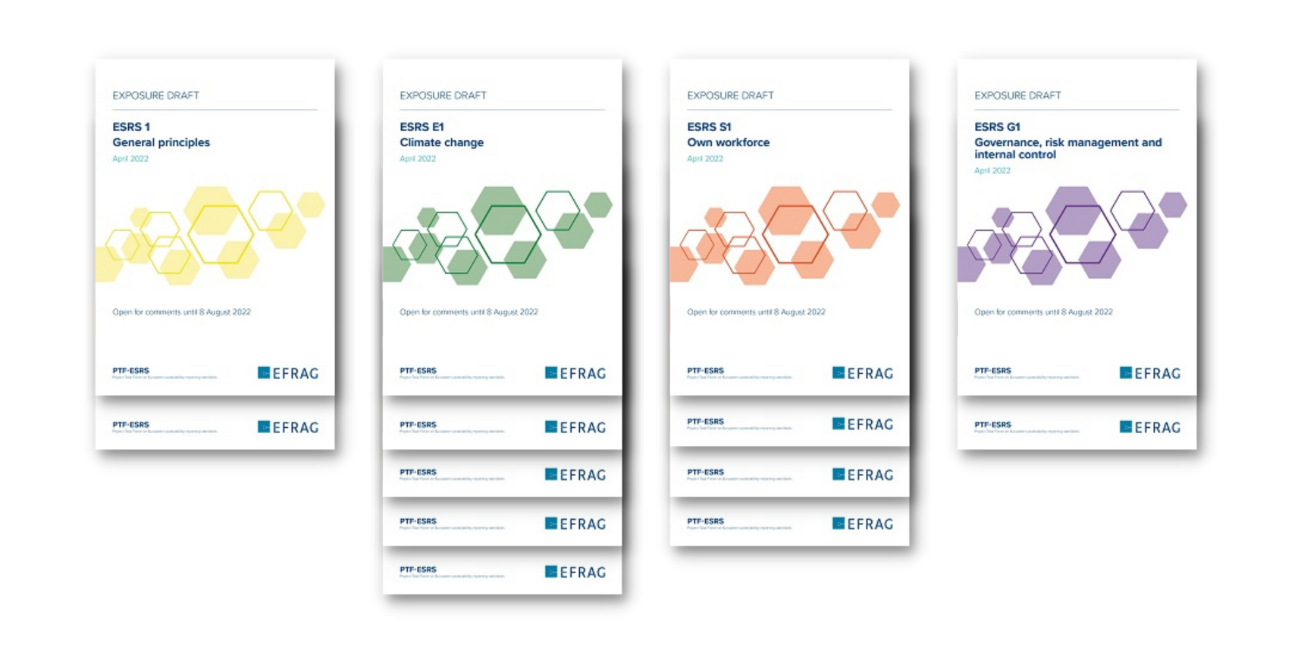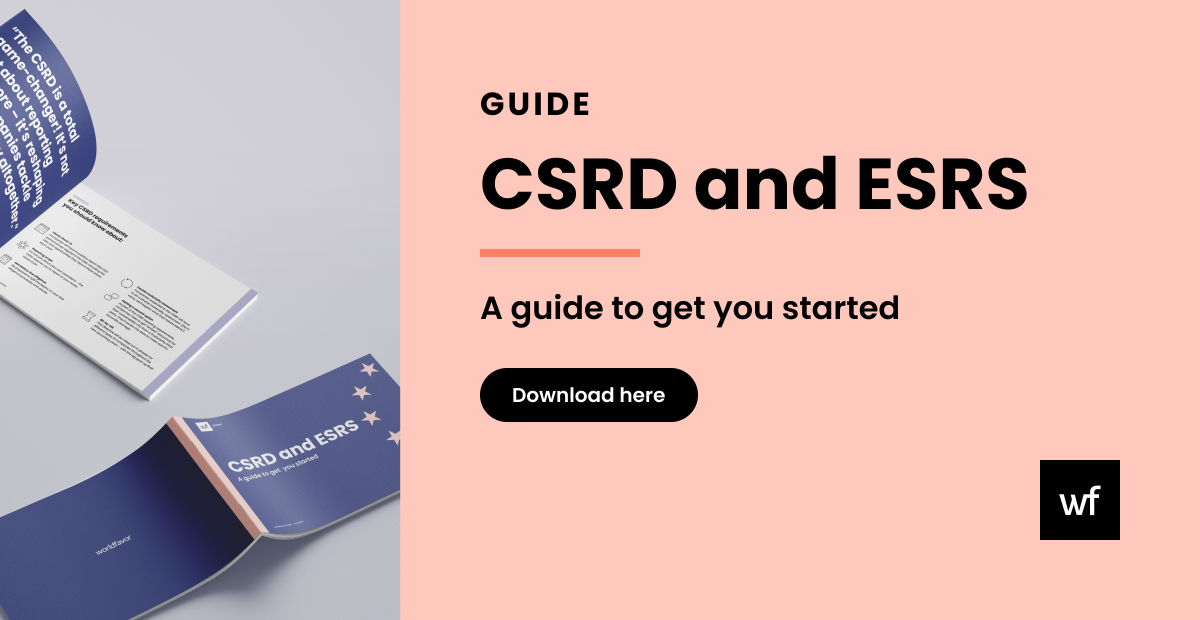What are the ESRS, the EU’s new mandatory Sustainability Reporting Standards?

Updated: October 2024
Have you heard about the EU Sustainability Reporting Standards – the European Commission's upcoming set of EU compliance and disclosure requirements? If you haven’t yet, we can promise that you’ll start to hear it everywhere soon. The ESRS is a key element of the EU’s new Corporate Sustainability Reporting Directive (CSRD) and has been praised as the change-changing standard for corporate sustainability reporting. For the first time ever on an EU-wide level, Environmental, Social, and Governance (ESG) information and corporate sustainability disclosure will be required to be reported in a standardized, comparable and more consistent format – just like financial reporting.
Nearly 50.000 companies operating within EU-regulated markets will be expected to align their reporting to the ESRS or other established framework. While this is a great step to combat corporate greenwashing, this will also pose a big challenge for many reporting companies – in particular first-time reporters.
So, to help you prepare, we have gathered everything you need to know about the ESRS: what are the requirements? Which companies are affected? And what are our tips to get started?
Let’s dive in!
Key takeaways of the European Sustainability Reporting Standards
- Reporting Standards Reporting under the ESRS will be mandatory for all companies covered by the EU’s Corporate Sustainability Reporting Directive, starting from 2024
- There are currently 12 ESRSs drafts, and the EU has proposed adding SMEs specific and sector-specific draft standards in late 2023. The sector-specific drafts are delayed for 2 years. Drafts could be issued for public consultation in late 2024 or early 2025. They can be expected to become delegated acts earliest in 2026.
- The ESRS will be aligned to already existing European policies and international standards to avoid double reporting
What are the EU Sustainability Reporting Standards (ESRS)?
The EU Sustainability Reporting Standards are the EU’s new mandatory standards that companies under the CSRD must align their reporting to. The aim of the standards is to ensure that in-scope companies report comparable, relevant, and reliable sustainability information – while simultaneously making it crystal clear what they are expected to report on. The standards are being developed by the European Financial Reporting Advisory Group (EFRAG), and the first set of draft ESRS will be delivered to the European Commission by mid-November 2022.
The 12 proposed ESRSs are divided into three categories:
- 1 standard on general principles
- 1 standard on cross-cutting disclosure requirements
- Specific disclosure requirements on 10 ESG topics (five on environmental topics, four on social topics, and one on governance)

The exposure drafts of the European Sustainability Reporting Standards. Source: EFRAG.
In addition, the EU has proposed Small and Medium size enterprises (SMEs) specific and sector-specific standards. The sector-specific drafts are delayed for 2 years and could be issued for public consultation in late 2024 or early 2025. They can be expected to become delegated acts earliest in 2026. As most of the business enterprises in Europe are classified as SMEs, they are an essential part of the European economy and crucial for the EU’s goal of achieving a net-zero economy. The SME standards will be less rigorous compared to the standards that will apply to larger companies to take away some of the heavy reporting burdens – but will cover the needs investors and other stakeholders may have.
The end to the alphabetic soup of sustainability standards
The ESRS are based on already existing European policies and international standards, such as the SFDR, the GRI, to avoid multiple reporting requirements. This means that the threshold to align to the ESRS will be lower for companies that already have standardized their corporate sustainability and ESG reporting according to these frameworks.
Which companies will be affected by the ESRS?
All companies covered by the EU Corporate Sustainability Reporting Directive (CSRD) will be required to align their corporate sustainability and ESG report according to the ESRS. These companies covered by the CSRD are:
- All large companies regardless of capital market orientation with 1) more than 250 employees, and 2) more than 50 million EUR in net turnover, or, 25 million EUR in assets.
- All capital-market SMEs, except for micro-enterprises*, starting from 2026. According to the EU (Directive 2013/34/EU), companies qualify as small if they exceed one of these two thresholds: 1) more than 10 employees, 2) more than 700 00 EUR in net turnover, and 3) 350 000 EUR in assets.
*Less than 10 employees or below 20 Million 2 EUR. Enterprises in this category are the only ones not covered by the CSRD and thus are not expected to report under ESRS.
ESRS timeline and scope updates
1st January 2024: Companies that are currently obliged to report under the EU’s Non-Financial Reporting Directive (NFRD), i.e large-listed companies with more than 500 employees, will be required to start reporting under the ESRSs for the financial year 2024 (i.e reports issued 2025).
1st January 2025: Large companies covered by the CSRD need to report under the ESRS from the financial year 2025 (i.e reports issued 2026).
1st January 2026: SMEs and other small and non-complex institutions must implement the CSRD and align to the ESRS from the financial year 2026. However, they will have the option to opt out of the reporting rules until 1st January 2028.
Subscribe to our blog to stay updated with changes and news on the CSRD and ESRS.
Align your reporting to the ESRS in Worldfavor
Start preparing for the Corporate Sustainability Reporting Directive and mandatory European Sustainability Reporting Standards by start tracking relevant ESG data in Worldfavor. We got all the sustainability reporting frameworks in place, such as the SFDR, the GRI, and will naturally adopt the platform to the ESRSs requirements when they are finalized. Interested in hearing more? One of our teammates would love to tell you more about it!
Related blog posts you might like:







%20as%20the%20deadline%20approaches.%20Learn%20about%20compliance%20requirements%2c%20potential%20delays%2c%20and%20key%20updates..png)

